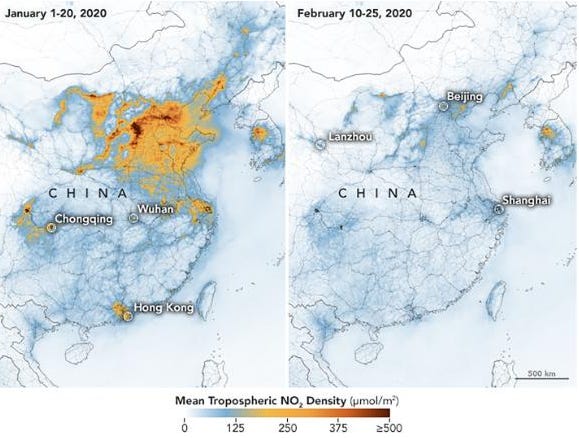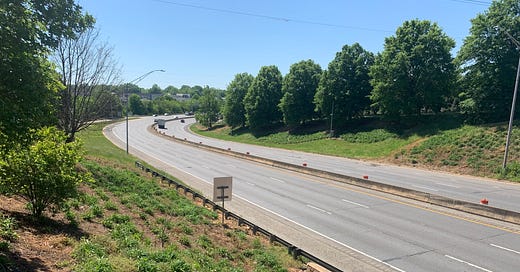We're driving less. So how's the air?
Air quality elsewhere has improved in the last couple months, but advances in Charlotte are tough to quantify
This article was published in The Charlotte Ledger e-newsletter on April 24, 2020. Find out more and sign up for free here.
We're driving less. So how’s the air?
By Shawn Flynn
Several weeks into the nearly worldwide stay-at-home orders, we’re living a real-life experiment about economics and our planet. New data and images show a dramatic improvement in the air quality in several parts of the world.
Everybody seems to be driving less. And some factories are idle. We’re all seeing the gorgeous Carolina blue skies during the day and remarkably clear and bright stars at night. Is it because there’s less air pollution now in Charlotte?
Air quality experts say it’s still too soon to tell if the recent changes to our lifestyles and economy are making the air cleaner. Any improvement, they say, has as much to do with the time of year as any potential reduction in air pollution.
“We are seeing hints of changes in air quality that may be a result of less activity, but it’s still too soon to say definitively,” said Brian Magi, associate professor of atmospheric sciences, climate change and air quality at UNC Charlotte.

I-277 is pretty empty for a weekday around lunch time these days. Drivers in the Charlotte region are hitting the roads about 45% less than usual, according to a recent figures, and raising the prospect that local air quality could be improving.
Mecklenburg improvement
Air Quality has improved in Mecklenburg County over the past decade. The number of “good” air quality days has increased from 107 in 2004 to 234 in 2019. Currently, Mecklenburg County meets all federal health-based air quality standards.

The number of “good” air quality days in Mecklenburg County days doubled in the 15 years ending in 2019, before changes stemming from the pandemic took effect. (Source: Mecklenburg County)
County officials credit the improved air quality in the region to strict state and federal requirements for industrial facilities and motor vehicles.
“Mecklenburg County has remarkably good air quality most of the year, so detecting a measurable and sustained change in local air quality will be a challenge,” Magi said.
It’s clear, though, that some of the contributors to air pollution are being sidelined because of the pandemic.
Charlotte driving plunges:INRIX is a company that analyzes and manages traffic data. A week-to-week survey of the United States since mid-March shows a dramatic decrease in passenger vehicle travel. Since March 14, Americans are traveling about 48% less. INRIX data shows the Charlotte region is about average with about 45% fewer miles driven than normal.
That lack of demand is one reason gas prices have plummeted 35% in the Charlotte region in the last year, to an average of $1.72 on Thursday, according to AAA Carolinas. You should also be getting a refund from your auto insurance company, and there’s a good chance you could be breathing a bit easier.
Potentially big stakes
The World Health Organization estimates 4.2 million people die annually from exposure to outdoor air pollutants.
Marshall Burke, an assistant professor at Stanford’s Department of Earth System Science, told CNN the better air quality could save between 50,000 and 75,000 people from dying prematurely.
Another study conducted at Harvard University suggests people with Covid-19 who live in U.S. regions with higher levels of air pollution are more likely to die from the disease than people who live in less polluted areas.
The study is the first to look at the link between long-term exposure to fine particulate air pollution and the risk of death from the coronavirus.
Pollution falls elsewhere
Researchers claim China continues to have some of the worst air pollution around the world, but the reaction to the coronavirus might have improved it, at least temporarily.
The coronavirus first started in the Wuhan province of China. Between January and February, when the country was at the height of the Covid-19 crisis, satellite images show a dramatic difference in the levels of nitrogen dioxide — an air pollutant most commonly emitted from burning fossil fuels, from auto emissions and generating power. Furthermore, pictures of video on the ground show clear skies over industrial areas normally filled with smog.

But just because it’s happening in China doesn’t mean it will happen in Charlotte.
“China’s baseline for pollution in the air is very different from our starting point, and that’s why they might be seeing such a bigger improvement,” said Megan Green, air quality program manager with Mecklenburg County.
Other parts of the U.S. might be seeing improvements, too. An attention-grabbing headline last week suggested air quality levels improved as much as 30% in the Northeast United States.
A NASA satellite “drive-by” over the New England area paints an impressive picture. Researchers warn, however, that the air pollution observed by the satellite is different from ground-level pollutants and caution against drawing the wrong conclusions.
Overall, it’s still very early in the process. The data is just starting to become available to make any definitive statements. And of course nobody knows whether the reductions in driving are short-lived or the start of a longer-term trend.
“I would think of what we’re going through would be an ‘episode,’ a situation that is changing behavior and norms,” Green said. “From an analysis standpoint, we would wait for the episode to be over. We don’t have any data points yet to draw any conclusions.”
Shawn Flynn has spent more than a quarter century as a journalist, including the past 17 years here in Charlotte. He is currently a freelance writer who teaches and consults with several nonprofits. You can contact him at ShawnKFlynn@gmail.com or follow him on Twitter @FlynnShawn.
Need to sign up for this e-newsletter? Here you go:
Got a news tip? Think we missed something? Drop us a line at editor@cltledger.com and let us know.
Like what we are doing? Feel free to forward this along and to tell a friend.
Archives available at https://charlotteledger.substack.com/archive.
On Twitter: @cltledger
Sponsorship information: email editor@cltledger.com.
The Charlotte Ledger is an e-newsletter and web site publishing timely, informative, and interesting local business news and analysis Mondays, Wednesdays, Fridays and Saturdays, except holidays and as noted. We strive for fairness and accuracy and will correct all known errors. The content reflects the independent editorial judgment of The Charlotte Ledger. Any advertising, paid marketing, or sponsored content will be clearly labeled.
Executive editor: Tony Mecia; Managing editor: Cristina Bolling; Contributing editor: Tim Whitmire; Reporting intern: David Griffith


